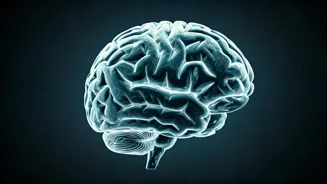Defining Brain Fog
Brain fog is a term used to describe a set of cognitive symptoms that impact the way a person thinks. It's not a formal medical diagnosis but rather a collection
of experiences that indicate some level of impaired cognitive function. This mental cloudiness may manifest as forgetfulness, difficulty concentrating, and problems with mental clarity. Individuals may have difficulty with language, experience sluggish thinking processes, and struggle to make decisions. Various factors contribute to these symptoms, with many individuals reporting their appearance during moments of stress or when experiencing specific health issues.
Spotting the Signs
Bhagyashree, a notable public figure, has identified three prominent indicators of brain fog, which are particularly noticeable in people in their 40s. The first sign is forgetting something immediately after it happens, like entering a room and forgetting why. Another sign is struggling to find the right words during conversations, which leads to hesitation in speaking. The third indicator is a decreased ability to focus on tasks or maintain attention for a prolonged period. Recognizing these signs is the initial step in understanding the problem and searching for solutions. They serve as signals that your mental processes may not be functioning at their peak.
Managing Brain Fog
To combat brain fog, focus on lifestyle adjustments and cognitive strategies. Prioritize consistent sleep, as this is essential for consolidating memories and restoring cognitive function. Incorporate physical exercise into your routine; any activity can help enhance blood flow to the brain and improve cognitive sharpness. Ensure you consume a balanced diet, rich in vital nutrients, and monitor your intake of processed foods and refined sugars. Mindfulness practices, like meditation, can also be helpful in reducing stress, improving focus, and restoring mental clarity. It is recommended that those experiencing brain fog consider consulting a healthcare professional for personalized guidance and to exclude any underlying medical issues.















